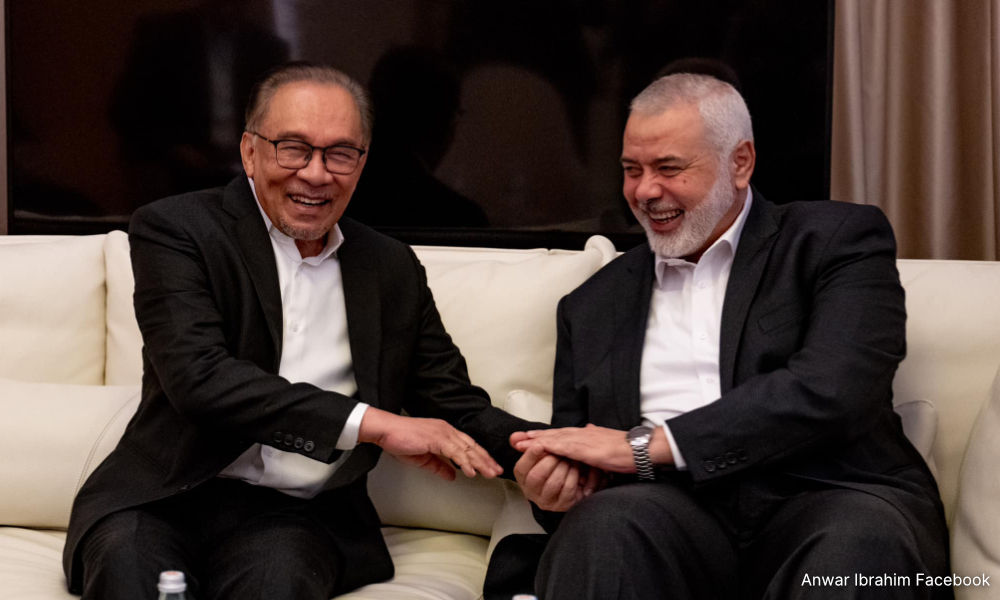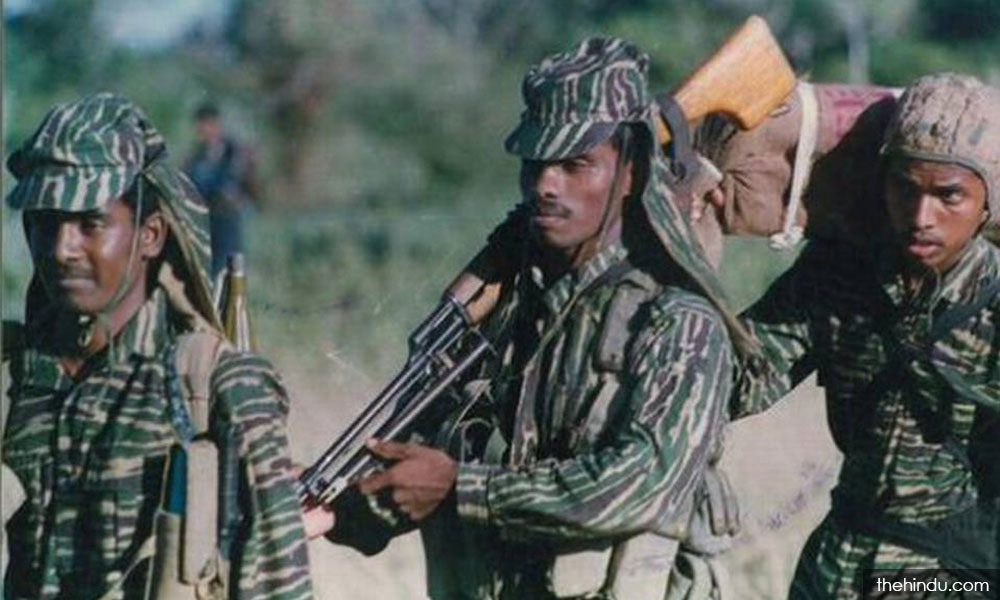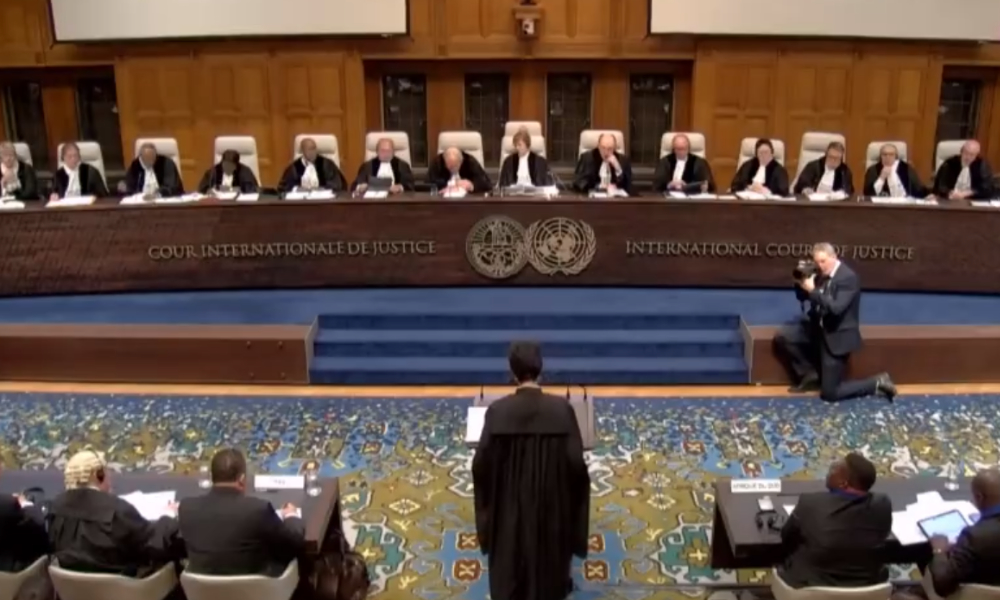Some time ago, I read a question posted on X, “Mengapa orang Cina dan India di Malaysia tak nampak sangat sokong Palestin? Tapi orang bukan Islam di luar negara sangat bersungguh memperjuangkan Palestin (Why don’t the Chinese and Indians in Malaysia seem to support Palestine? But non-Muslims abroad are up in arms fighting for Palestine).”
This is not true, as there are scores of Chinese, Indians, and other races voicing out against the unfolding genocide in Gaza. Harmit Singh, the co-founder of Gerakan Belia Se-Punjabi Malaysia, is a clear example: the young activist was arrested for protesting in front of the US embassy.
This is a cherry-picking tweet, I thought.
But then, podcaster Khairy Jamaluddin expressed a similar sentiment with a thinly veiled venom.
When Prime Minister Anwar Ibrahim reached out to Hamas leader Ismail Haniyeh, Khairy posted an Instagram Story with the caption, "This is a good stand and I salute PMX for this. What is shocking is the negative comments from Malaysiakini readers which border on Zionist sympathies.
“Saya tahu profile pembaca Malaysiakini yang tulis komen seperti itu. Tapi tak nak cakap la. Nanti orang kata 3R la apa la. DNA asal tu tak boleh nak ubah, kan (I know the profiles of the Malaysiakini readers who commented like that. But I don’t want to say anything. People might say it’s 3R or something. DNA can’t be changed, right)?"

We know what he implied. Since this sentiment seems more prevalent than I thought, it needs addressing.
My journey in the Palestinian cause started in 2012 when I was roped in by a Malay-Muslim friend, Amar, who perhaps knew my stand from an International Relations class, to speak at an event called Malaysia Global March to Jerusalem (MyGMJ).
I didn’t know it at the time, but the Islamic movement Ikram organised the event, and I was one of the few, if not the only, non-Muslim speakers.
I was fine with it and took it as an honour to express solidarity with an oppressed community living under occupation. But a Chinese Christian friend’s reaction to my speech was slightly disappointing, “Why do you want to care about this Muslim issue?”
At that point, I could have interpreted her remark like Khairy and the X user did, ie to take this one behavioural snapshot and generalise to a whole group of people. But I didn’t condemn her as a racist or a Zionist.
Plausible explanations
Whether it’s this friend’s reaction or the less-than-enthusiastic reaction by some communities today to the Palestinian cause, I feel there are four plausible explanations for such behaviour:
A) Malaysians have different foreign policy interests due to our unique historical and cultural connections to certain regions or places.
Malays care deeply about the Middle East, Chinese pay close attention to Taiwan, Hong Kong and China, and Indians mind the developments in India, particularly Tamil Nadu, and Sri Lanka where there’s a sizeable Tamil community.
I don’t expect the average Malay to know much about Tiananmen Square or the Tamil Tigers, or the average Chinese or Indian to know much about the Palestinian-Israeli conflict, let alone the difference between Hamas and Fatah.
If you don’t believe this theory (linguistic/ethnic fragmentation of regional interest), go to a newspaper stand and check out the foreign news coverage across different newspapers.
B) Misplaced anger. In psychology, misplaced/displaced anger is a type of anger that is directed towards someone or something that is not the actual cause of the negative emotion. Maybe a person got denied a public scholarship and saw someone of a different skin colour get the scholarship with lesser qualifications.
The seething resentment made them adopt a revengeful belief that “the enemy of my enemy is my friend.” Essentially, this is a projection or externalisation of an internal/domestic conflict.
C) Indifference is not a crime when we are guilty of it most other times. Some people feel outraged and shocked when others do not explicitly express solidarity for their cause, but they never express solidarity with causes that do not concern them or their group.
D) A big part of solidarity for the Palestinian cause in Malaysia has been religion-based solidarity with fellow ummah. This strongly mobilises the Malay Muslims but may alienate non-Muslim support if more humanist language is not supplemented.
Two more things I will say. First, some of the people who are “perplexed” why fellow Malaysians have not expressed support for Hamas are the same people who condemn sympathy for Tamil Tigers in the strongest terms because they are designated as a terrorist group.

Remember when 12 individuals with alleged links with the Liberation Tigers of Tamil Eelam (LTTE) were detained under the Security Offences (Special Measures) Act 2012 in 2019?
We condemn militant liberation struggles as terrorists when they are not “our guy” but when they are “our guy”, we demand them to be worshipped as freedom fighters.
This brings me to the second point: liberation struggles are nuanced, history is not black and white, and violent resistance is sometimes necessary - even Nelson Mandela believed this.
Everyone knows Mandela was imprisoned for two decades but do you know why he was incarcerated?
It’s not because he was singing kumbaya - he was convicted for sabotage and conspiracy to violently overthrow the apartheid government in South Africa.
An outright rejection of the oppressed’s right to resort to violence, when the oppressor has clearly engaged in everyday cruelty and violence, is not playing neutral - it is siding with the oppressor.
“Both-siding” a genocide in which 35,000 Palestinian civilians, mostly women and children, have been killed, is not a neutral act.
Opposing oppression
Hamas is an Islamist liberation group which resorts to violence to oppose oppression - not everyone is comfortable with that. I get that. But remember, Tamil Tigers and Mandela’s African National Congress also resorted to armed struggle.
Mandela himself was a strong and loyal friend to the Palestinian cause till the end of his life because he knew what it’s like to be oppressed and fighting back, even if violently. He famously said, “We know too well that our freedom is incomplete without the freedom of the Palestinians.”
Today, South Africa continues Mandela’s legacy by acting on their solidarity with Palestinians by bringing the Israeli government to the International Court of Justice.

To the ones perplexed over the fragmentation of your fellow countrymen and women's opinions regarding Palestine, I wish to say all these things can be equally true:
i) Supporting Palestine does not necessarily entail supporting Hamas.
ii) Not supporting Hamas doesn't mean not supporting the Palestinian cause. If someone is reluctant to support the use of violence or boycott certain products, they are not necessarily Zionist sympathisers.
iii) If other people are not as worked up as you are for a certain cause and you feel anger, consider how many times you have been indifferent to a cause which does not involve you and your ethnic/religious group.
iv) Condemning the genocide committed by Israel's government is not necessarily anti-Israel or antisemitic.
v) Understand why it is reasonable for people to support Hamas’ use of violence in the context of liberation struggles against a much more powerful oppressor.
vi) If you are either anti-Palestinian or anti-Semitic, that’s a completely different matter which deserves condemnation.
vi) Whatever someone may think of Hamas, Tamil Tigers, or Mandela as either freedom fighters or terrorists, the only thing I ask is that they are consistent in their reasoning and criteria. - Mkini
OOI KOK HIN is a political sociologist who dabbles in civil society.
The views expressed here are those of the author/contributor and do not necessarily represent the views of MMKtT.



No comments:
Post a Comment
Note: Only a member of this blog may post a comment.